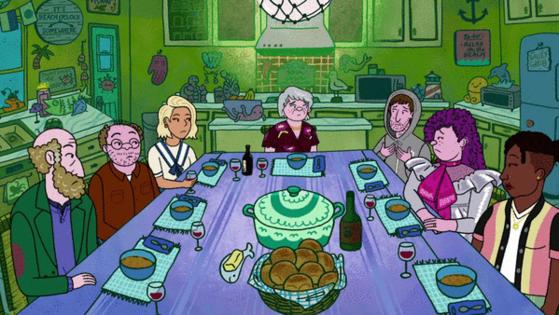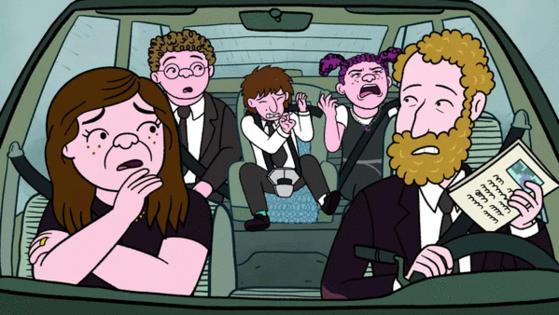Review: 'Long Story Short' is a moving tale of a modern Jewish American family
Published in Entertainment News
"Long Story Short," which premiered Friday on Netflix, is the sweet, melancholy, satirical, silly, poignant, hopeful, sometimes slapstick cartoon tale of a middle-class Jewish family, told nonchronologically from the 1990s to the 2020s. For all its exaggerations — and unexaggerated portrayals of exaggerated behaviors — it is remarkably acute, and surprisingly moving, about relations between parents and children and brothers and sisters and about the passage of time and the lives time contains. The eight-episode season is bookended with funerals.
On a plane ride home, Avi Schwooper (Ben Feldman), his last name combining his parents' Schwartz and Cooper, plays new girlfriend Jen (Angelique Cabral) a recording of Paul Simon's "The Obvious Child," in which a character goes from a baby to a married man in the space of a verse. "That's time, right?" he says, setting a theme and a strategy. In the episodes that follow, we'll see relationships begin and end; children born and grown, not necessarily in that order. Things change, things fall apart, things last.
Created by "BoJack Horseman" creator Raphael Bob-Waksberg — Avi is drawn to resemble him — and designed by Lisa Hanawalt (who inspired and designed the "BoJack" characters and created "Tuca & Bertie"), it has the look of a children's book, bright, colorful and busy, aggressively two-dimensional, with wobbly bold lines and squiggly patterns. Deceptively sophisticated and wonderfully expressive, it is full of lifelike details, without being made to resemble life.
Avi's parents are Naomi Schwartz (Lisa Edelstein), intense and serious, and Elliot Cooper (Paul Reiser), laid-back and humorous. Avi, who writes about music, will go on to marry Jen (blond, gentile); Hannah (Michaela Dietz) is their smart, socially isolated daughter. Avi's sister Shira (Abbi Jacobson), the angry middle child, will start a family with Kendra (Nicole Byer), a Black woman who is Jewish by choice. Younger brother Yoshi (Max Greenfield) is a bit of a lost soul — "sometimes I just feel like the extra one," he'll say — diagnosed as an adolescent with ADD, dyslexia and executive function disorder. ("I never gave him enough attention," Naomi says, rushing to claim the guilt. "Now he has a deficit.")
Though each episode is a piece in the mosaic, each has its own story to tell: Yoshi selling mattresses that come in a tube; Avi mixed up with self-righteous parents as he campaigns to remove wolves from Hannah's school (the wolves, by contrast, are drawn realistically); Kendra at work at a birthday arcade called BJ Barnacles; Yoshi on a nocturnal adventure in San Francisco — the show is set around the Bay Area — with a former friend of his sister, attempting to retrieve a lost bag; Shira attempting to make her mother's knishes; an improvised Shabbat in a desert motel. There are inside family jokes ("Is not a schnook," Cousin Moishe) that will pay off after a while; a school holiday pageant ("Hanukkah, Ramadan, Kwanzaa too/ We tolerate them all, but there's nothing like Christmas," runs a song in the background). Yoshi has a bar mitzvah; Naomi is honored for her charitable work. Occasional weird inventions are folded in: a "hambulance" delivering ham; food trucks selling potato ice cream and soup on a stick; something called Pacifier Shirt Syndrome, caused by rubbing a dropped pacifier on a short.
Although I suspect this subject is interesting only to (us) Jews, it took a long time for any sort of Jewish specificity to make it to the screen, especially given who built the movie business. (Assimilation was the name of the game for a people blamed for a scapegoated race.) Even now, it doesn't happen all that much. You could sense it on "Seinfeld," see it on "Curb Your Enthusiasm" a lot. There are the current Netflix rom-com "Nobody Wants This," with Kristen Bell in a relationship with Adam Brody's rabbi, and the recent Adam Sandler-produced "You Are So Not Invited to My Bat Mitzvah." And there is the odd Holocaust drama.
But in this moment, with its confounding mix of classical antisemitism, fake anti-antisemitism brandished as a weapon against universities and what gets called antisemitism simply because it's critical of Israel, it's not a bad thing to get a relatively straightforward look at a contemporary American Jewish family. Together, the characters represent the spectrum of religious attitudes — from atheist to convert, selectively to very observant — but all are steeped in the culture.
Hannah, whose gentile mother makes her "not Jewish," wonders if her wanting a bat mitzvah might be "cultural appropriation."
"Look, if Adolf Hitler saw you, I don't think he'd be doing the math on technically how halachically Jewish you are," says her father. "He'd throw you in the oven with the rest of us. … If you're Jewish enough for Hitler, you're Jewish enough for me."
That the show can be a little obscure from time to time — I had to look up "Moshiach" to get one joke — just deepens its world. But anyone who's ever shared a family joke, or wanted to ask a question of someone no longer around to answer it, or compared notes with a sibling on a parent never fully understood will recognize themself here.
———
‘LONG STORY SHORT’
Rating: TV-14
How to watch: Netflix
———
©2025 Los Angeles Times. Visit latimes.com. Distributed by Tribune Content Agency, LLC.
















Comments